初中八大种时态讲解与练习
初中英语八大时态讲解及练习全

初中英语八大时态讲解及练习全LELE was finally revised on the morning of December 16, 2020一、一般现在时:概念:经常、反复发生的动作或行为及现在的某种状况。
时间状语:always, usually, often, sometimes, every week (day, year, month…), once a week, on Sundays, etc.基本结构:①be动词;②行为动词否定形式:①am/is/are+not;②此时态的谓语动词若为行为动词,则在其前加don't,如主语为第三人称单数,则用doesn't,同时还原行为动词。
一般疑问句:①把be动词放于句首;②用助动词do提问,如主语为第三人称单数,则用does,同时,还原行为动词。
在中,当主语是时,谓语动词要用形式,即常在后加-s或-es。
一、he, she, it是第三人称单数。
如:He likes watching TV. 他喜欢看电视。
She has lunch at twelve. 她十二点吃午餐。
It looks like a cat. 它看起来像只猫。
(口诀:I用am,you用are,is用于它,单数名词用is,都用are)二、单个人名、地名或称呼作主语;是第三人称单数。
如:①Han Mei looks like her mother. 看起来像她的母亲。
②Beijing is in China. 北京在中国。
③Uncle Wang often makes cakes. 王叔叔经常做蛋糕。
三、单数可数名词或"this / that / the+单数可数名词"作主语时,是第三人称单数。
如:①A horse is a useful animal. 马是有用的动物。
②This book is yours. 这本书是你的。
四、someone, somebody, nobody, everything, something等及指示代词this, that作主语时,是第三人称单数。
初中英语八大时态详解及专项训练(附答案)(期末复习资料)!
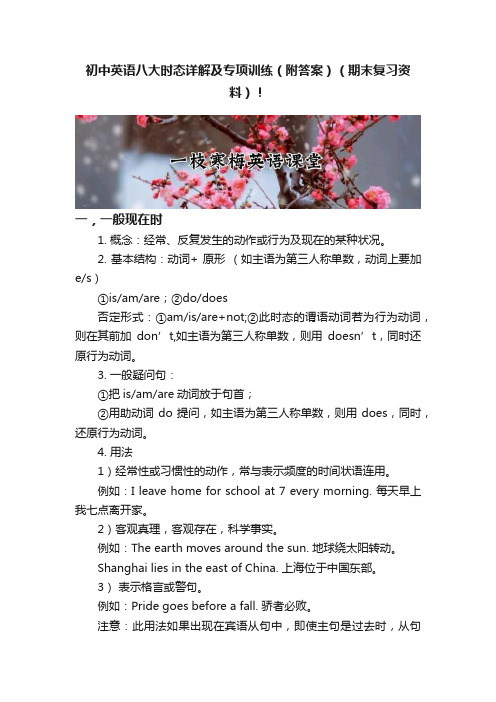
初中英语八大时态详解及专项训练(附答案)(期末复习资料)!一,一般现在时1. 概念:经常、反复发生的动作或行为及现在的某种状况。
2. 基本结构:动词+ 原形(如主语为第三人称单数,动词上要加e/s)①is/am/are;②do/does否定形式:①am/is/are+not;②此时态的谓语动词若为行为动词,则在其前加don’t,如主语为第三人称单数,则用doesn’t,同时还原行为动词。
3. 一般疑问句:①把is/am/are动词放于句首;②用助动词do提问,如主语为第三人称单数,则用does,同时,还原行为动词。
4. 用法1)经常性或习惯性的动作,常与表示频度的时间状语连用。
例如:I leave home for school at 7 every morning. 每天早上我七点离开家。
2)客观真理,客观存在,科学事实。
例如:The earth moves around the sun. 地球绕太阳转动。
Shanghai lies in the east of China. 上海位于中国东部。
3)表示格言或警句。
例如:Pride goes before a fall. 骄者必败。
注意:此用法如果出现在宾语从句中,即使主句是过去时,从句谓语也要用一般现在时。
例如:Columbus proved that the earth is round. 哥伦布证实了地球是圆的。
4)现在时刻的状态、能力、性格、个性。
例如:I don't want so much. 我不要那么多。
He writes good English but does not speak well.他英语写得不错,讲的可不行。
5)一般现在时表示将来含义。
a. 下列动词come, go, arrive, leave, start, begin, return的一般现在时可以表示将来,主要用来表示在时间上已确定或安排好的事情。
例如:The train leaves at six tomorrow morning. 火车明天上午六点开。
初中英语语法-八种时态详解与练习
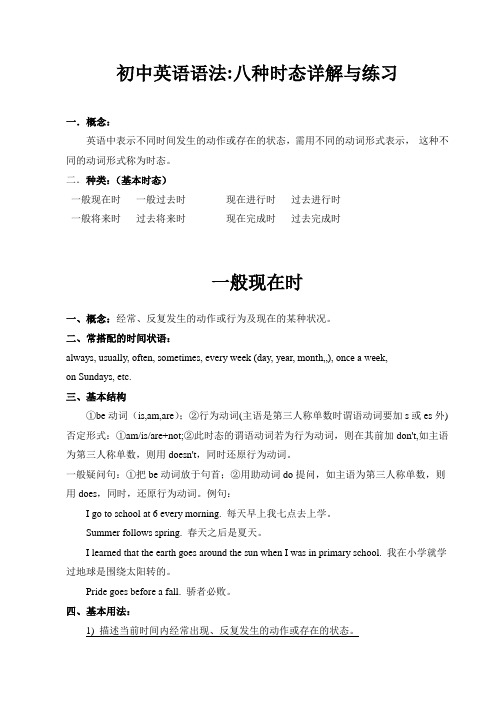
初中英语语法:八种时态详解与练习一.概念:英语中表示不同时间发生的动作或存在的状态,需用不同的动词形式表示,这种不同的动词形式称为时态。
二.种类:(基本时态)一般现在时一般过去时现在进行时过去进行时一般将来时过去将来时现在完成时过去完成时一般现在时一、概念:经常、反复发生的动作或行为及现在的某种状况。
二、常搭配的时间状语:always, usually, often, sometimes, every week (day, year, month…), once a week,on Sundays, etc.三、基本结构①be动词(is,am,are);②行为动词(主语是第三人称单数时谓语动词要加s或es外) 否定形式:①am/is/are+not;②此时态的谓语动词若为行为动词,则在其前加don't,如主语为第三人称单数,则用doesn't,同时还原行为动词。
一般疑问句:①把be动词放于句首;②用助动词do提问,如主语为第三人称单数,则用does,同时,还原行为动词。
例句:I go to school at 6 every morning. 每天早上我七点去上学。
Summer follows spring. 春天之后是夏天。
I learned that the earth goes around the sun when I was in primary school. 我在小学就学过地球是围绕太阳转的。
Pride goes before a fall. 骄者必败。
四、基本用法:1) 描述当前时间内经常出现、反复发生的动作或存在的状态。
在这种情景中,句子常带有表示频率的时间状语:always , everyday , often , once a week (month , year , etc.) , sometimes , seldom , usually等等,以表示句中的动作或状态是习惯性的、经常性的。
初中英语时态讲解及练习(全)

时间状语:Tomorrow, next day(week, month, year…),soon, in a few minutes, by…,the day after tomorrow, etc.
否定形式:主语+am/is/are not going to do ; 主语+will/shall not do+其他 一般疑问句:be放于句首;will/shall提到句首。
1.I ____(write, am writing, is writing, are writing) a letter now. 2.Look, it _____(begin, is beginning, am beginning, are beginning) to rain. 3.They ____(study, is studying, am studying, are studying) medicine at the Medical Institute of Chengde these days. 4.He _____(teach, am teaching, is teaching, are teaching) an English lesson at this time.
谓语动词使用过去式形式, 加ed,分为规则和不规则变 化。表示过去经常发生的动 作,也可用“used to do ” 和“would +动词原形”。
1. He____(be, was, were, been) here a moment ago. 2. They ____(be, was, were, been) here just now. 3. The scientists _____(leave, leaves, leaved, left) for America yesterday. 4. Last week we ______(visit, visited ) the Science Museum. 5. When I was a child, I often ____(play, played) football. 6. The students ran out of the classroom as soon as the bell ____(ring, rang, rung).
初中英语八大时态全套精讲及练习题(附答案)

初中英语八大时态全套精讲及练习题.1 一般此刻时的用法1)常常性或习惯性的动作,常与表示频度的时间状语连用。
时间状语: every, , sometimes,ofen,always,usually, twice a week, at , , on Sunday Ileave home for school at 7 every morning. He watches Tv once a week .2) 客观真谛,客观存在,科学事实。
The earth moves around the sun. Shanghai lies in the east of China.3) 表示格言或警语中。
Pride goes before a fall. 骄者必败。
注意:此用法假如出此刻宾语从句中,即便主句是过去时,从句谓语也要用一般此刻时。
例:Columbus proved that the earth is round..4) 此刻时辰的状态、能力、性格、个性。
I don't want so much.Ann Wang writes good English but does not speak well.比较:Now I put the sugar in the cup.I am doing my homework now.第一句用一般此刻时,用于操作演示或指导说明的示范性动作,表示言行的瞬时动作。
再如: Now watch me, I switch on the current and stand back.第二句中的now 是进行时的标记,表示正在进行的动作的客观状况,所此后句用一般此刻时。
二 . 组成及变化1、 be 动词的变化必定句:主语 +be(am,is,are)+其余。
如: I am a boy. 我是一个男孩。
否认句:主语 + be + not +其余。
如: He is not a worker. 他不是工人。
初中英语语法八大时态总结及练习题
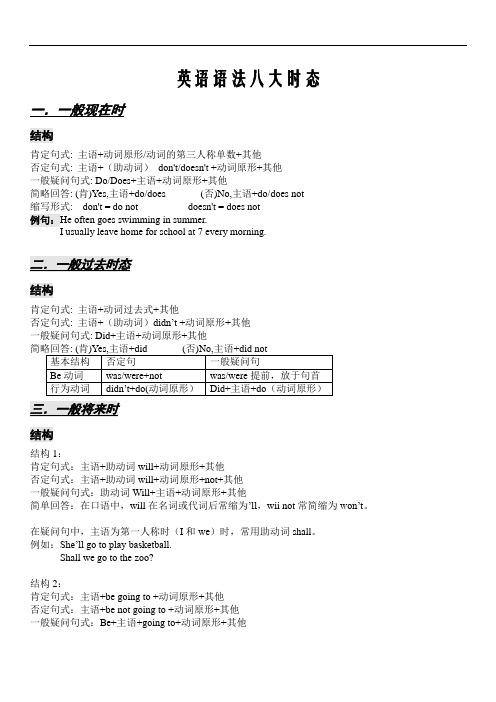
英语语法八大时态一.一般现在时结构肯定句式: 主语+动词原形/动词的第三人称单数+其他否定句式: 主语+(助动词)don't/doesn't +动词原形+其他一般疑问句式: Do/Does+主语+动词原形+其他简略回答: (肯)Yes,主语+do/does (否)No,主语+do/does not缩写形式: don't = do not doesn't = does not例句:He often goes swimming in summer.I usually leave home for school at 7 every morning.二.一般过去时态结构肯定句式: 主语+动词过去式+其他否定句式: 主语+(助动词)didn’t +动词原形+其他一般疑问句式: Did+主语+动词原形+其他基本结构否定句一般疑问句Be动词was/were+not was/were提前,放于句首行为动词didn’t+do(动词原形)Did+主语+do(动词原形)三.一般将来时结构结构1:肯定句式:主语+助动词will+动词原形+其他否定句式:主语+助动词will+动词原形+not+其他一般疑问句式:助动词Will+主语+动词原形+其他简单回答:在口语中,will在名词或代词后常缩为’ll,wii not常简缩为won’t。
在疑问句中,主语为第一人称时(I和we)时,常用助动词shall。
例如:She’ll go to play basketball.Shall we go to the zoo?结构2:肯定句式:主语+be going to +动词原形+其他否定句式:主语+be not going to +动词原形+其他一般疑问句式:Be+主语+going to+动词原形+其他简略回答:(肯)Yes,主语+be (否)No,主语+be not将来时其他表示法1)be going to表示将来表示说话人的打算、计划、安排或根据迹象判断必然或很可能发生的事情。
(完整word)初中英语八大时态的详细讲解与练习

初中英语语法:八种时态详解与练习一.概念:英语中表示不同时间发生的动作或存在的状态,需用不同的动词形式表示,这种不同的动词形式称为时态。
二.种类:(基本时态)一般现在时一般过去时现在进行时过去进行时一般将来时过去将来时现在完成时过去完成时一般现在时一、概念:经常、反复发生的动作或行为及现在的某种状况。
二、常搭配的时间状语:always, usually, often, sometimes, every week (day, year, month…), once a week,on Sundays, etc.三、基本结构①be动词(is,am,are);②行为动词(主语是第三人称单数时谓语动词要加s或es外) 否定形式:①am/is/are+not;②此时态的谓语动词若为行为动词,则在其前加don't,如主语为第三人称单数,则用doesn't,同时还原行为动词。
一般疑问句:①把be动词放于句首;②用助动词do提问,如主语为第三人称单数,则用does,同时,还原行为动词。
例句:I go to school at 6 every morning. 每天早上我七点去上学。
Summer follows spring. 春天之后是夏天。
I learned that the earth goes around the sun when I was in primary school. 我在小学就学过地球是围绕太阳转的。
Pride goes before a fall. 骄者必败。
四、基本用法:1) 描述当前时间内经常出现、反复发生的动作或存在的状态。
在这种情景中,句子常带有表示频率的时间状语:always , everyday , often , once a week (month , year , etc.) , sometimes , seldom , usually等等,以表示句中的动作或状态是习惯性的、经常性的。
初中英语八大时态讲解及练习(全)

初中英语八大时态讲解及练习(全)概念:经常、反复发生的动作或行为及现在的某种状况。
时间状语:always, usually, often, sometimes, every week (day, year, month…), once a week, on Sundays, etc.基本结构:①be动词;②行为动词否定形式:①am/is/are+not;②此时态的谓语动词若为行为动词,则在其前加don't,如主语为第三人称单数,则用doesn't,同时还原行为动词。
一般疑问句:①把be动词放于句首;②用助动词do提问,如主语为第三人称单数,则用does,同时,还原行为动词。
在一般现在时中,当主语是第三人称单数时,谓语动词要用第三人称单数形式,即常在动词原形后加-s或-es。
一、人称代词he, she, it是第三人称单数。
如:He likes watching TV. 他喜欢看电视。
She has lunch at twelve. 她十二点吃午餐。
It looks like a cat. 它看起来像只猫。
(口诀:I用am,you用are,is用于她他它,单数名词用is,复数名词都用are)二、单个人名、地名或称呼作主语;是第三人称单数。
如:①Han Mei looks like her mother. 韩梅看起来像她的母亲。
②Beijing is in China. 北京在中国。
③Uncle Wang often makes cakes. 王叔叔经常做蛋糕。
三、单数可数名词或"this / that / the+单数可数名词"作主语时,是第三人称单数。
如:①A horse is a useful animal. 马是有用的动物。
②This book is yours. 这本书是你的。
四、不定代词someone, somebody, nobody, everything, something等及指示代词this, that 作主语时,是第三人称单数。
初中英语必考八大时态详解(后附练习题与答案)
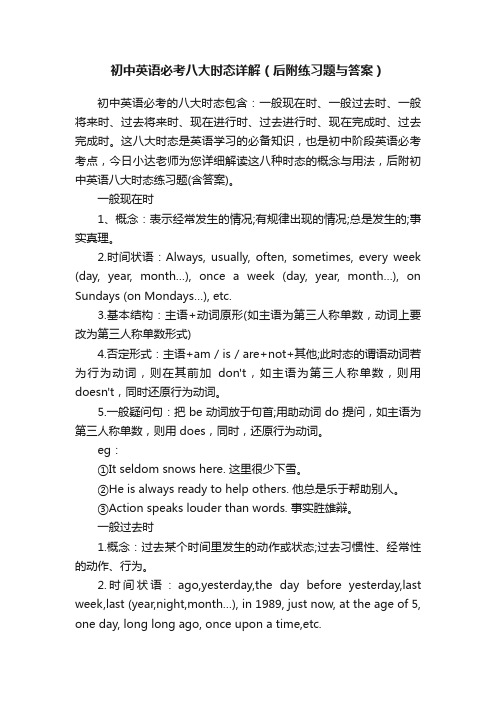
初中英语必考八大时态详解(后附练习题与答案)初中英语必考的八大时态包含:一般现在时、一般过去时、一般将来时、过去将来时、现在进行时、过去进行时、现在完成时、过去完成时。
这八大时态是英语学习的必备知识,也是初中阶段英语必考考点,今日小达老师为您详细解读这八种时态的概念与用法,后附初中英语八大时态练习题(含答案)。
一般现在时1、概念:表示经常发生的情况;有规律出现的情况;总是发生的;事实真理。
2.时间状语:Always, usually, often, sometimes, every week (day, year, month…), once a week (day, year, month…), on Sundays (on Mondays…), etc.3.基本结构:主语+动词原形(如主语为第三人称单数,动词上要改为第三人称单数形式)4.否定形式:主语+am / is / are+not+其他;此时态的谓语动词若为行为动词,则在其前加don't,如主语为第三人称单数,则用doesn't,同时还原行为动词。
5.一般疑问句:把 be 动词放于句首;用助动词 do 提问,如主语为第三人称单数,则用 does,同时,还原行为动词。
eg:①It seldom snows here. 这里很少下雪。
②He is always ready to help others. 他总是乐于帮助别人。
③Action speaks louder than words. 事实胜雄辩。
一般过去时1.概念:过去某个时间里发生的动作或状态;过去习惯性、经常性的动作、行为。
2.时间状语:ago,yesterday,the day before yesterday,last week,last (year,night,month…), in 1989, just now, at the age of 5, one day, long long ago, once upon a time,etc.3.基本结构:主语+动词的过去式或 be 的过去式+名词4.否定形式:主语+was / were+not+其他;在行为动词前加didn't,同时还原行为动词。
英语八大时态介绍(附练习题)

英语八大时态介绍一般现在时一般现在时基本用法介绍:(一)一般现在时的功能1.表示事物或人物的特征、状态。
如:The sky is blue.天空是蓝色的。
2.表示经常性或习惯性的动作。
如:I get up at six every day.我每天六点起床。
3.表示客观现实。
如:The earth goes around the sun.地球绕着太阳转。
(二)一般现在时的构成1.be动词:主语+be(am,is,are)+其它。
如:I am a boy.我是一个男孩。
2.行为动词:主语+行为动词(+其它)。
如:We study English.我们学习英语。
当主语为第三人称单数(he, she,it)时,要在动词后加"-s"或"-es"。
如:Mary likes Chinese.玛丽喜欢汉语。
(三)一般现在时的变化1. be动词的变化。
否定句:主语+ be + not +其它。
如:He is not a worker.他不是工人。
一般疑问句:Be +主语+其它。
如:-Are you a student? -Yes. I am. / No, I'm not.特殊疑问句:疑问词+一般疑问句。
如:Where is my bike?2.行为动词的变化。
否定句:主语+ don't( doesn't ) +动词原形(+其它)。
如:I don't like bread.当主语为第三人称单数时,要用doesn't构成否定句。
如:He doesn't often play.一般疑问句:Do( Does ) +主语+动词原形+其它。
如:- Do you often play football?当主语为第三人称单数时,要用does构成一般疑问句。
如:- Does she go to work by bike? - Yes, she does. / No, she doesn't.特殊疑问句:疑问词+一般疑问句。
初中英语八大时态讲解及练习(全)

初中英语八大时态讲解及练习(全)-CAL-FENGHAI.-(YICAI)-Company One1一、一般现在时:概念:经常、反复发生的动作或行为及现在的某种状况。
时间状语:always, usually, often, sometimes, every week (day, year, month…), once a week, on Sundays, etc.基本结构:①be动词;②行为动词否定形式:①am/is/are+not;②此时态的谓语动词若为行为动词,则在其前加don't,如主语为第三人称单数,则用doesn't,同时还原行为动词。
一般疑问句:①把be动词放于句首;②用助动词do提问,如主语为第三人称单数,则用does,同时,还原行为动词。
在中,当主语是时,谓语动词要用形式,即常在后加-s或-es。
一、he, she, it是第三人称单数。
如:He likes watching TV. 他喜欢看电视。
She has lunch at twelve. 她十二点吃午餐。
It looks like a cat. 它看起来像只猫。
(口诀:I用am,you用are,is 用于它,单数名词用is,都用are)二、单个人名、地名或称呼作主语;是第三人称单数。
如:①Han Mei looks like her mother. 看起来像她的母亲。
②Beijing is in China. 北京在中国。
③Uncle Wang often makes cakes. 王叔叔经常做蛋糕。
三、单数可数名词或"this / that / the+单数可数名词"作主语时,是第三人称单数。
如:①A horse is a useful animal. 马是有用的动物。
②This book is yours. 这本书是你的。
四、someone, somebody, nobody, everything, something等及指示代词this, that作主语时,是第三人称单数。
初中英语八大时态总结(精讲、习题、答案)
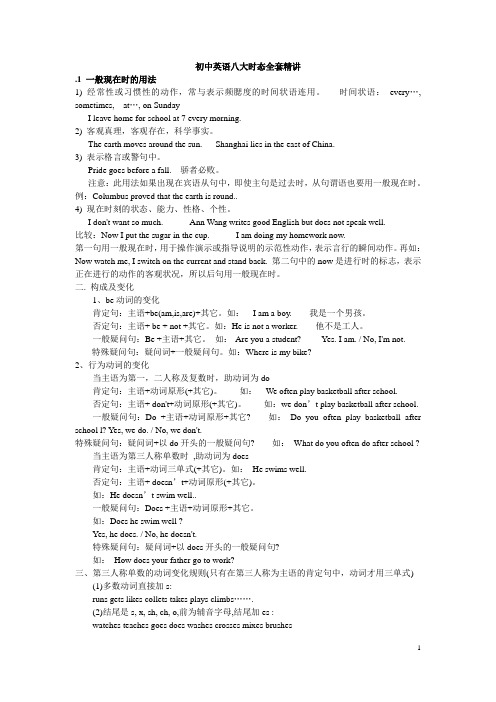
初中英语八大时态全套精讲.1 一般现在时的用法1) 经常性或习惯性的动作,常与表示频腮度的时间状语连用。
时间状语:every…, sometimes,at…, on SundayI leave home for school at 7 every morning.2) 客观真理,客观存在,科学事实。
The earth moves around the sun.Shanghai lies in the east of China.3) 表示格言或警句中。
Pride goes before a fall.骄者必败。
注意:此用法如果出现在宾语从句中,即使主句是过去时,从句谓语也要用一般现在时。
例:Columbus proved that the earth is round..4) 现在时刻的状态、能力、性格、个性。
I don't want so much. Ann Wang writes good English but does not speak well.比较:Now I put the sugar in the cup.I am doing my homework now.第一句用一般现在时,用于操作演示或指导说明的示范性动作,表示言行的瞬间动作。
再如:Now watch me, I switch on the current and stand back. 第二句中的now是进行时的标志,表示正在进行的动作的客观状况,所以后句用一般现在时。
二. 构成及变化1、be动词的变化肯定句:主语+be(am,is,are)+其它。
如:I am a boy.我是一个男孩。
否定句:主语+ be + not +其它。
如:He is not a worker.他不是工人。
一般疑问句:Be +主语+其它。
如:-Are you a student?-Yes. I am. / No, I'm not.特殊疑问句:疑问词+一般疑问句。
中考英语八大时态精解+精练+答案

中考英语八大时态精解+精练+答案一、一般现在时1、概念:表示经常发生的情况;有规律出现的情况;总是发生的;事实真理。
2.时间状语:Always, usually, often, sometimes, every week (day, year, month…), once a week (day, year, month…), on Sundays (on Mondays…), etc.3.基本结构:主语+动词原形(如主语为第三人称单数,动词上要改为第三人称单数形式)4.否定形式:主语+am / is / are+not+其他;此时态的谓语动词若为行为动词,则在其前加don't,如主语为第三人称单数,则用doesn't,同时还原行为动词。
5.一般疑问句:把be 动词放于句首;用助动词do 提问,如主语为第三人称单数,则用does,同时,还原行为动词。
eg:①It seldom snows here. 这里很少下雪。
②He is always ready to help others. 他总是乐于帮助别人。
③Action speaks louder than words. 事实胜雄辩。
二、一般过去时1.概念:过去某个时间里发生的动作或状态;过去习惯性、经常性的动作、行为。
2.时间状语:ago,yesterday,the day before yesterday,last week,last (year,night,month…), in 1989, just now, at the age of 5, one day, long long ago, once upon a time,etc.3.基本结构:主语+动词的过去式或be 的过去式+名词4.否定形式:主语+was / were+not+其他;在行为动词前加didn't,同时还原行为动词。
5.一般疑问句:was 或were 放于句首;用助动词do 的过去式did 提问,同时还原行为动词。
(完整word版)初中八种基本时态讲解及练习
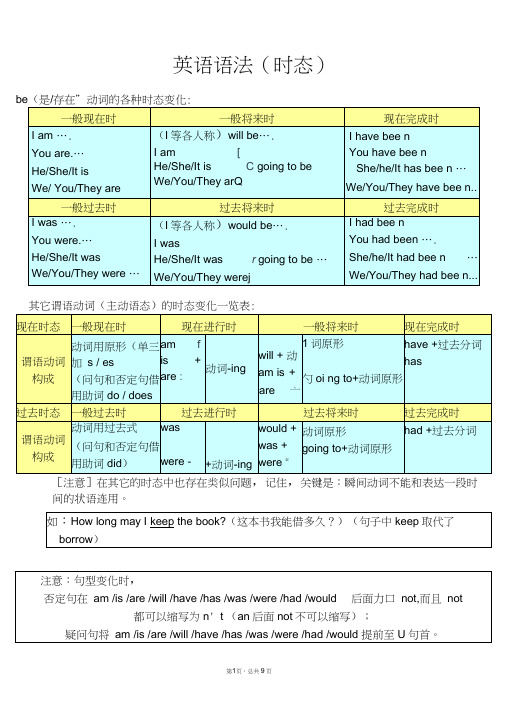
英语语法(时态)be(是/存在”动词的各种时态变化:其它谓语动词(主动语态)的时态变化一览表:[注意]在其它的时态中也存在类似问题,记住,关键是:瞬间动词不能和表达一段时间的状语连用。
八种时态的具体用法:(1)一般现在时:表示现阶段经常或习惯发生的动作或存在的状态,或说明主语的特征。
①一般现在时句子中常有的时间状语:ofte n,usually,sometimes,always,every(day 等),once/twice,a (week等),on (Sunday 等),never,in the (morning等)。
女口:They go to the Palace Museum once a year(他们每年去一次故宫” They ofte n discuss bus in ess in the eve ning(他们经常在晚上商谈生意)②表示客观真理、事实、人的技能或现在的状态时句子里一般不用时间状语。
女口:The earth turns round the sun.(地球绕着太阳转)/Light travels faster than sound .(光传播比声音快)③表示十分确定会发生(如安排好的事情)或按照时间表进行的事情,用一般现在可以表达将来句子中可以有将来时间。
如: The train for Haikou leaves at 8 : 00 in the morning.(开往海口的列车上午8 点开车)④在时间状语从句中(以when, after, before, while, until, as soon as等引导)和条件状语从句中(以if,unless引导),用一般现在时代替一般将来时,句子可以有将来时间。
女口:Please ring me up as soon as you arrive in Germany.(你一至U德国就给我打电话)/If it rains tomorrow.we will have to stay at home. (如果明天下雨我们就只好呆在家)⑤一般现在时用于倒装句中可以表示正在发生的动作,动词以come, go为主。
初中八大时态讲解与练习
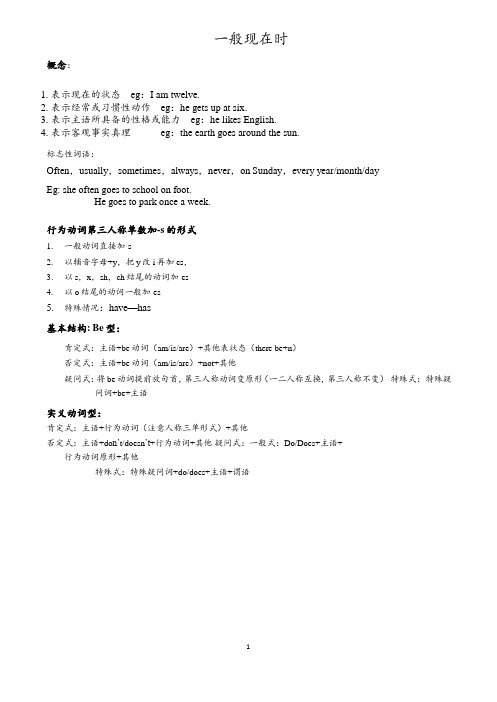
一般现在时概念:1. 表示现在的状态eg:I am twelve.2. 表示经常或习惯性动作eg:he gets up at six.3. 表示主语所具备的性格或能力eg:he likes English.4. 表示客观事实真理eg:the earth goes around the sun.标志性词语:Often,usually,sometimes,always,never,on Sunday,every year/month/dayEg: she often goes to school on foot.He goes to park once a week.行为动词第三人称单数加-s 的形式1. 一般动词直接加-s2. 以辅音字母+y,把 y 改 i 再加 es,3. 以 s,x,sh,ch 结尾的动词加-es4. 以 o 结尾的动词一般加-es5. 特殊情况:have—has基本结构: Be 型:肯定式:主语+be 动词(am/is/are)+其他表状态(there be+n)否定式:主语+be 动词(am/is/are)+not+其他疑问式:将 be 动词提前放句首,第三人称动词变原形(一二人称互换,第三人称不变)特殊式:特殊疑问词+be+主语实义动词型:肯定式:主语+行为动词(注意人称三单形式)+其他否定式:主语+do n’t/doesn’t+行为动词+其他疑问式:一般式:Do/Does+主语+行为动词原形+其他特殊式:特殊疑问词+do/does+主语+谓语小试牛刀:写出下列动词的第三人称形式wash:match:study:finish:go:snow:carry:stop: see: drive:let:teach:keep: join: put:do: drink: toy: play: begin:take:run: fly: talk: stay:look:watch:think:carry:fix:单项选择1. There an English film at the cinema now.A:is B:are C:am D:be2. The picture nice.A:look B:looks C:looked D:be look3. He sits down and soon asleep.A:fall B:falling C:falled D: falls4. The water sweet.A:drinking B:drinks C:drink D:to drink5. I up at six but Mike up at sevenA:get,gets B:get ,get C:gets,get D:getting, to get6. My father for eight hours every day.A:working B:works C:work D:to work7. Uncle Wang never English, because he know how to say it.A:speak,doesn’t B:speak,don’t C:speaks,don’t D:speaks,doesn’t 8. On Sunday my daughter watching TV and my son to play footballwith his friends.A:like,want B:likes,want C:like,wants D:likes,wants 9. Su Yang usually some clothes on Sunday.A:washed B:washs C:washes D:washing 10. Su Hai and Su Yang eight lessons this term.A:have B:has C:haves D:having用所给词的正确形式填空A. We often (not play)on the playground.B.you (brush) your teeth every day.C. How many lessons your classmate (have) on Sunday.D. It (take) me two hours to finish my homework every day.E. The child often (watch) TV in the evening.F. What (do) he usually (do) after school.G. John (study) Math , Chinese ,English ,Science and Art at school.H. Mr. Wang often (go) to Shanghai.I. There (be) a football match on TV every morning.J. We (not watch)TV on Monday.句式训练➢Do you like to play football after school?肯定句肯定/否定回答:➢I have many books.否定句:一般疑问句:肯定回答:否定回答:➢Nancy doesn’t run fast.肯定句:➢I usually play football on Friday afternoon.否定句:一般疑问句:特殊疑问句:肯定/否定回答:➢Tom does his homework at home.否定句:一般疑问句:特殊疑问句:➢Mike has two letters for him.否定句:一般疑问句:特殊疑问句:否定回答:判断正误1. Is your brother speak English?2. Does he likes going fishing?3. Jane do his homework every morning.4. He like play basketball with his friends.5. We eats dinner at six and go to bed at eleven.6. My dog runs fast.7. He speak English very well.8. What do they usually do on Saturday.9. My mother don’t have breakfast this morning.10. I like reading books on the library every day.中考真题1.Jenny! Do you know that one-third of the boys in our class the singer Zhang Shao Han?A. likeB. likesC.liking2. The sense of happiness will increase if you what you like to do.A. doB. didC. will do3. Betty will ring me up when she inBeijing.A. arriveB. arrivesC. arrivedD. willarrive4. If you your homework, you can go out to play football.5.Now my father his bike to work every day instead of driving.A. rideB. r od eC. ridesD. will ride6. This girl is rea d y t o help p eo pl e an y time. Wh e n sh e is on t h e bu s,sh e al w a y s her seat to someone in need.A. givesB. giveC. gaveD.giving概念:一般过去时表示过去某个时间収生的动作或存在的状态. Eg: I got up at seven yesterday表示过去经常収生的动作或存在的状态. Eg: he always went to school by car last term标志性词语:yesterday,last month/year/week/night,the day before yesterday,in the past,at that time,two days ago,just n ow……..动词过去时的变化规则:一般在词尾直接+ed play——played以 e 结尾的动词直接+d taste—— tasted末尾三个字母以“辅+元+辅”且为重读闭音节,双写末尾辅音+ed stop——stopped以辅音字母+y,改 y 为 i 再+ed study——studied不规则动词过去式:am/is: a re:do:see:sa y:give: eat:w rit e: sp en d:get:take:sp eak:drin k:g o:r un:rid e:sle ep:c o me:sin g:swim:s t and:has/ha ve:pu t:sit:rea d:结构:Be 型肯定式:主语+be 动词(was/were)+其他否定式:主语+wasn’t/weren’t+其他疑问式:Be 动词+主语+其他(一二人称互换,第三人称不变)特殊疑问句:特殊疑问词+was/were+主语+其他实义动词型肯定式:主语+动词过去式+其他否定式:主语+didn’t+动词原形+其他疑问式:Did+主语+动词原形+其他特殊疑问句:特殊疑问词+did+主语+动词原形+其他用所给单词正确形式填空◆We (enjoy) ourselves at the party last night.◆Jack (study) for the English test last Sunday.◆ you (go) to the Great Wall last year?◆What day (be) it yesterday?◆The old man (be)ill and went to see a doctor.◆We (have) a party last night.◆We (visit) the museum and went home.◆—How (be) the students? —They were very friendly.◆My mother (not do) housework yesterday.◆—he (have) lunch at nine? —No, he did n’t.◆They (buy) a guitar yesterday.◆the cat (eat)a bird yesterday night.◆They (play)chess in the classroom last PE lesson.◆Nancy (pick)up orange on the farm last week.◆My mother (cook)a nice food last spring festival.◆I (be)at school just now.◆He (be)at the camp last week.◆The mobile phone (be)on the table yesterday evening.◆I (make)a model ship with Mike yesterday.◆What (do)you do last month.单项选择( ) 1. Lee his mobile phone at home.A. leaveB. leavesC. leavedD. left( ) 2. he a good rest? No, he didn’t.A. Do, hadB. Did, haveC. Did, hadD. Was, had( ) 3. As soon as he , he to his family.A. arrived, writesB. arrived, writtenC. arrived, wroteD. arriveds, write( ) 4. Mr. Black was late because he his way.A. lostedB. loseC. losesD. lost( ) 5. When Lee school this morning?A. did, got toB. did, get toC. did, getD. did, got( ) 6. Will you please say it again? I quite you.A. didn’t, hearB. don’t, heardC. didn’t, heardD. don’t, hear ( ) 7. you at six o’c lock yesterday?A. Do ,get upB. Did, get upC. Do, got upD. Did, got up ( ) 8.What did you see ?A. nowB. every dayC. these daysD. just now ( ) 9.He went into the room and the door.A. lockB. lockingC. locksD. locked ( ) 10. —What you last week? —I bought a bag.A. did ,buyB. did , boughtC. do, buyD. do, bought ( ) 11. —he his lunch? —Yes, he did.A. Does ,hasB. Does, haveC. Did, haveD. Did, had ( )12.—Did the thieves into the car? —No, they .A. fell, did n’tB. fall(落下), didC. jump(跳), didn’tD. jump, did ( ) 13. -When did May come back from Hong Kong?-She from Hong Kong last Friday.A. come backB. comes backC. returned backD. came back ( ) 14. she this dictionary in the bookshop nearby last week?A. Did, buyB. Does, buyC. Did, boughtD. Does, buys ( ) 15. He to the station this morning and was for the train.A. hurry, in timeB. hurries, on timeC. hurried, in timeD. hurried, at time句型转换1. Frank read an interesting book about history. (一般疑问句)Frank an interesting book about history?2. Thomas spent RMB 10 on this book. (否定句)Thomas RMB 10 on this book.3. I didn’t have any friends. (一般疑问句)have friends?4. She watched TV after supper(划线部分提问)she after supper.5. There was some orange in the fridge.(一般疑问句)there_ orange in the fridge?改错题1. How is Jane yesterday?2. He go to school by bus last week.3. He often goes home at 6:00 last month.4. I can fly kites seven years ago.5. Did you saw him just now.6. Tom wasn’t watch TV last night.7. I didn’t my homework yesterday. 8. He wait for you three hours ago.9. Who find it just now ? 10. What did he last week?综合训练1.They read English last night.否定句:一般疑问句:肯定/否定回答:划线部分提问:2.She didn’t buy a dictionary last week.肯定句:一般疑问句:肯定/否定回答:划线部分提问:一般将来时概念:现在看将要収生的动作或存在的状态.标志性词语:Tomorrow,soon,next year,next year / week / month, in a few days, in the future, this afternoon,the day after tomorrow,one hour later,tomorrow morning。
初中英语八大时态讲解与练习(全)

一、一般现在时:概念:经常、反复发生的动作或行为与现在的某种状况。
时间状语:always, usually, often, sometimes, every week (day, year, month…), once a week, on Sundays, etc.基本结构:①be动词;②行为动词否定形式:①am/is/are+not;②此时态的谓语动词若为行为动词,则在其前加don't,如主语为第三人称单数,则用doesn't,同时还原行为动词。
一般疑问句:①把be动词放于句首;②用助动词do提问,如主语为第三人称单数,则用does,同时,还原行为动词。
在一般现在时中,当主语是第三人称单数时,谓语动词要用第三人称单数形式,即常在动词原形后加-s或-es。
一、人称代词he, she, it是第三人称单数。
如:He likes watching TV. 他喜欢看电视。
She has lunch at twelve. 她十二点吃午餐。
It looks like a cat. 它看起来像只猫。
(口诀:I用am,you用are,is用于她他它,单数名词用is,复数名词都用are)二、单个人名、地名或称呼作主语;是第三人称单数。
如:①Han Mei looks like her mother. 梅看起来像她的母亲。
②Beijing is in China. 在中国。
③Uncle Wang often makes c akes. 王叔叔经常做蛋糕。
三、单数可数名词或"this / that / the+单数可数名词"作主语时,是第三人称单数。
如:①A horse is a useful animal. 马是有用的动物。
②This book is yours. 这本书是你的。
四、不定代词someone, somebody, nobody, everything, something等与指示代词this, that 作主语时,是第三人称单数。
初中英语八大时态全套精讲及练习题
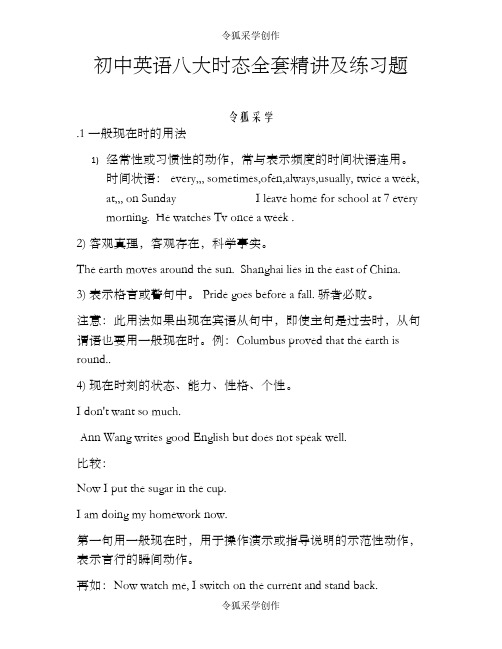
初中英语八大时态全套精讲及练习题令狐采学.1 一般现在时的用法1)经常性或习惯性的动作,常与表示频度的时间状语连用。
时间状语:every…, sometimes,ofen,always,usually, twice a week, at…, on Sunday I leave home for school at 7 every morning. He watches Tv once a week .2) 客观真理,客观存在,科学事实。
The earth moves around the sun. Shanghai lies in the east of China.3) 表示格言或警句中。
Pride goes before a fall. 骄者必败。
注意:此用法如果出现在宾语从句中,即使主句是过去时,从句谓语也要用一般现在时。
例:Columbus proved that the earth is round..4) 现在时刻的状态、能力、性格、个性。
I don't want so much.Ann Wang writes good English but does not speak well.比较:Now I put the sugar in the cup.I am doing my homework now.第一句用一般现在时,用于操作演示或指导说明的示范性动作,表示言行的瞬间动作。
再如:Now watch me, I switch on the current and stand back.第二句中的now是进行时的标志,表示正在进行的动作的客观状况,所以后句用一般现在时。
二. 构成及变化1、be动词的变化肯定句:主语+be(am,is,are)+其它。
如: I am a boy. 我是一个男孩。
否定句:主语+ be + not +其它。
如:He is not a worker. 他不是工人。
- 1、下载文档前请自行甄别文档内容的完整性,平台不提供额外的编辑、内容补充、找答案等附加服务。
- 2、"仅部分预览"的文档,不可在线预览部分如存在完整性等问题,可反馈申请退款(可完整预览的文档不适用该条件!)。
- 3、如文档侵犯您的权益,请联系客服反馈,我们会尽快为您处理(人工客服工作时间:9:00-18:30)。
初中八大时态讲解与练习中招考试八种时态一览表一、用动词的适当形式填空。
1. While we __________ (wait) for the bus, a girl _____ (run) up to us.2. I __________ (telephone) a friend when Bob ________ (come) in.3. Jim __________ (jump) on the bus as it __________ (move) away.4. We __________(test) the new machine when the electricity ___(go) off.5. She __________ (not want) to stay in bed while the others ________________ (all, work) in the fields.6. While mother ________ (put) Cathy to bed, the door bell _____ (ring).7. As I __________ (walk) in the park, it ________ (begin) to rain.8. Even when she _____ (be) a child, she ________________ (think) of becoming a scientist.9. It was quite late at night. George __________ (read) and Amy ________ (work) on herproject when they ________ (hear) a knock at the door.10. There _____ (be) a group of people around the fire when they _______(reach) it. An oldwoman __________ (sit) on the ground near the kettle. Two small children __________ (lie)near her. A donkey __________ (bend) his head over a tall girl.二、单项选择( )1.I will tell him as soon as he _____ back A. come B. comes C. will come D. came( )2. Mary _____ on shoes when she ____ them.A. tries…buysB. tries… buiesC. trys… buysD. trys… buies( )3. The girl often ______ cold when she ______.A. catch…dancesB. catches… dancesC. catchs…dancesD. catches… dance( )4. _____ he ____ himself there? No, I don't think so.A. Do…enjoyB. Does… enjoiesC. Does… enjoysD. Does…enjoy( )5. -_____ your teacher ____ from them very often? -Certainly.A. Do…hearB. Does…hearC. Do… receiveD. receive( )6. _____ your mother _____ some cleaning on Sundays?A. Does…doesB. Do…doesC. Does…doD. Do… do( )7. -_____ Tom _____to work hard to help his family ? -Yes, he _____.A. Has… x…doesB. Has…x…doesC. Does…has…hasD. Does… have…does( )8. Which teacher _____ lessons to you every day ? A. does …gives B. does… give C. do… give D. gives ( )9. Smith does not go fishing on weekdays, ____? _____ , he does.A. does he…NoB. does he…YesC. doesn't he…NoD. doesn't he…Yes( )10.Mr Black often _____ fishing on Sundays, _____ he ?A. goes…doesn'tB. goes…isn'tC. doesn't go…goesD. doesn't go…is( )11.He usually _____ TV on Sunday evening. A. watch B. watches C. watching D. is watching( )12. We'll go to play with snow if it ______ tomorrow. A. snow B. snows C. will snow D. snowed( )13. Neither I nor he ______ French. A. speak B. doesn't speak C. speaks D. doesn't speak( )14. Nobody ______ how to run(操纵) this machine. A . know B. have known C. knows D. is knowing ( )15. The Young Pioneer _____ water for the old man every day. A. carry B. bring C. takes D. carries ( )16. Some are ______ in the river and some are ______ games.A. swimming…plaiingB.swiming…playingC.swimming…playingD. swimming…plaing( )17. Look ! The boy students are _____ football while the girls are _____ .A. playing… danceB. playing… dancingC. play… dancingD. play… dance( )18. He _____ to do his lessons at eight every evening. A. is begining B. is beginning C. begin D. begins ( )19. _____ he _____ on well with his friends this term ?A. Does…getsB. Does…getC. Is…gettingD. Is…geting( )20. Mr Smith _____ short stories, but he ____ a TV play these days.A. is writing…is writingB. is writing…writesC. writes…is writingD. writes… writes( )21. I _____ to the cinema. I ______ there every Sunday.A. go…goB. am going… goC. go… am goin gD. am going…am going( )22. Look, they______ a good time, ____ they ?A. have…doB. have…don'tC. are having…areD. are having… aren't( )23. You ______ about the future now, ______ you ?A. don't think…don'tB. aren't thinking… aren'tC. don't think… doD. aren't thinking… are( )24. She always ______ something whenever she ______.A .studied…played B. studied…plaied C.. studied…plaied D. studyed… played( )25. He often _____ late in the forest. It _____ me very much.,A. s tayed…worriedB. staied… worriedC. stayed…worryedD. staied… worried( )26. I ______that the boy _____ with no tears in his eyes.A. noticed… cryedB. noticed… criedC. noticd…criedD. noticed… cryed( )27. We _____the floor and _____ all the windows.A. mopped…cleannedB. moped…cleanedC. mopped…cleanedD. moped…cleaned( )28. When I _____ the Children's Palace, the children _____ with joy.A. visitd… jumppedB. visite… jumpedC. visited… jumpedD. visited… jumpped( )29. ______ a sports meet last Sunday ? Yes , they ______.A. Did they have...did B. Did they have...had C. Had they...had D. Had they (i)( )30. ____ you _____out for a walk after supper ? Yes, I ______.A. Did...went...went B. Did... go... went C. Did... went... did D. Did...go (i)( )31. _____ Jack _____ on with his work or ______ to have a rest?A. Did…went…stoppedB. Did…go…stopC. Did…went…stopD. Did… go… stopped( )32. You gave them a talk two days ago, _____you ? Yes, I ______.A. did… didB. did… gaveC. didn't… didD. didn't… gave( )33. -____ your brother _____ a letter to ? - My father did.A. Who… wroteB. What…wroteC. Who did…write D What did… write( )34. They ___ about the TV news then in the sitting-room. They often ____ such talksA. talked…hadB. talk…haveC. were talking…hadD. are talking…have( )35. He ______ some cooking at that time, so he _____ me.A. did…heardB. did…didn't hearC. was doing…heardD. was doing…didn't hear( )36. " _____ you angry then?" "T hey______ too much noise.”A. Are…were makingB. Were…were makingC. Are…madeD. Were… made( )37. This time yesterday, Jack _____ his bike. He _____ TV. A. repaired…didn't watchB. was repairing…watchedC. repaired…watchedD. was repairing… wasn't watching( )38. We _____ for Tom at ten last Sunday. He often kept us ______.A. were waiting…waitingB. were waiting…waitC. waited…waitingD. waited… wait( )39. When you ____ at the door, I _____ some washing.A. knocked(敲)…didB. was knocking…didC. knocked…was doingD. knock…am doing( )40. The boy_____ English on the radio when I _____ his door.A. learned…was openingB. was learning… openedC. learned…openedD. is learning…open( )41. When they______ through the forest, a bear _____ at them.(come at:袭击)A. walked…was comingB. were walking… cameC. were walking…comesD. walk…is coming( )42. A young man _____ her while she _____ her work .A. watched… was doingB. was watching… didC. watched… didD. was watching… was doing( )43. While mother _____ some washing, I ______ a kite for Kack.A. did… madeB. was doing… madeC. was doing… was makingD. did… was making( )44. I _____ myself French from 7 to 9 yesterday morning. I _____ to work.A. was teaching… didn't goB. taught… didn't goC. was teaching… wentD. taught… went( )45. He _____ a model plane when I came to see him. A. makes B. is making C. was making D. made( )46. I ______ a letter at nine last night. A. is writing B. was writing C. wrote D. is writing( )47. The teacher_____ us a history lesson when Tom walked into the classroom.A. gaveB. is givingC. was givenD. was giving( )48. There will be a football match in two days, that is _______.A. last SundayB. next SundayC. every SundayD. this Sunday( )49. We ______ a class meeting this November. A. had B. have C. will have D. are having( )50. He ______ in his garden every morning next year. A. will work B. works C. worked D. is working 初中英语动词时态基础练习(二)( )51. Be careful. The train ______. A. will come B. came C. comes D. is coming( )52. Look at those clouds. It _____ soon, I'm afraid. A. is going to rain B. is raining C. will rain D. won't rain ( )53. The radio says it ______ the day after tomorrow. A. is going to snow B. is snowing C. will snow D. snows ( )54. _____ he _____ some shopping tomorrow afternoon ?A. Will…doesB. Is… going to doC.Is…doingD. Shall… do( )55. -What day _____ it ______ tomorrow ? -Wednesday.A. is… going to beB. will…beC. shall…beD. does…be( )56. The boy _______ sixteen years old next year. A. is going to be B. is growing to be C. will be D. is ( )57. _____ you ____ me up at six, please ?A. Are…going to wakeB. Are…wakingC. Will…wakeD. Do…wake( ) 58. If he ______ to college, he _____ a lot more.A.will go…will learnB.will go…is going to learnC.is going…is going to learnD. goes…will learn( )59. When she _____ next time , I ______ her everything.A. is going to come…shall tellB. will come…shall tellC. comes…will tellD. come…will tell( )60. What day ____ it ____ tomorrow ? It ____Tuesday.A. is…going to be… isB. will…be…willC. is…going to be…is goingD. will …be…will be( )61. She _____that she _____ her best to help them the next term.A. says…will doB. said…will doC. said… would doD. says…would do( )62. People _____ that the Smiths _____ for a holiday next week.A. say… will goB. said… will goC. said… would goD. say…would go( )63. Nobody _____ us that he _____ even stricter with usA. tell…will beB. tells…would beC. told…will beD. told…would be( )64. Please _____ him that we _____ able to help him.A. tell…will beB. tells… would beC. told…will beD. told… would be( )65. Jack _____ that they _____ surprised to see it this Friday.A. know… would beB. knows… will beC. knew… would beD. knew… will be( )66. I _____to know if Mary_____ by train that afternoon.A. want… would goB. want… will goC. wanted… would goD. wanted… will go( )67. _____ he _____ that they _____ home tomorrow?A. Does…learn…would goB. Does…learn…will goC. Did…learn…would goD. Did…learn…will go ( )68. We _____ that they _____ a sports meet tomorrow.A. learn… would haveB. have learned… would haveC. learn… will haveD. have learned… will have ( )69. ____ you _____ that he _____ his lost son one day ?A. Do…think…will findB.Do…thought…would findC.Did…think…willfindD. Did…thought…would find ( )70. I _____ that you _____ good care of her that day.A. thought…will takeB. thought…would takeC. thinks… will takeD. think… would take( )71. The visitors _____ where they _____ a short test.A. ask… would takeB. asked… will takeC. asked… would takeD. asked… can take( )72. John ____ sure that he ____ good at chemistry soon.A. be… will beB. is, would beC. was… will beD. wa s… would be( )73. She ____ ill so she ____ able to go skating the next day.A. is… won't beB. is… wouldn't beC. was… won' beD. was… wouldn't be( )74. He _____ the thief to the police when he _____ the man again.A. would take…would meetB. would take…metC. will take…will meetD. will take… met( )75. Mother ____ me a new coat yesterday, I _____ it on. It fits me well.A. has made…have triedB. made…have triedC. has made…triedD. made…tried( )76. " He ____ to draw horses a lready ."" When ____he ?”. " Last year. "A. learned...has B. learned...did C. has learned...has D. has learned (i)( )77. Tom ____ up into the tree. Look, he _____ high up there !A. has got… isB. has climbed… wasC. got… wasD. climbed… is( )78. _____you _____ the text yet ? Yes, we _____ it two hours ago.A. Did…copy…didB. Have… copied…haveC. Have… copied… didD. Did …copy…had( )79. "Why___ she _____angry?" "Because he _____ at he just now.A. did… get, shoutedB.has…got…shoutedC. did… get… has shoutedD. has…got…has shouted( )80. _____ you ______ the film before ? Where ____ you _____ it ?A. Have… seen… did… seeB. Did…see…did…watchC. Have…seen… have… seenD. Did…see…have…seen( )81. You _____ me waiting for two hours. I _____ for you since five.A. kept…waitedB. have kept…waitedC. kept…have waitedD. have kept…have waited( )82. Where _____John _____? To the library. He _____ there for an hour.A. has… been … has goneB. has…gone…has beenC. did… go… wentD. did…be…went( )83. _____ the baby still _____ ? No, it ______ crying.A. Has… cried… has stoppedB. Is…crying…stoppedC. Did… cry… stoppedD. Is…crying…has stopped( )84. I _____ the way. I ______ here for quite many years.A. knew... have lived B. knew... live C. know... have lived D. know (iv)( )85. _____ you ever _____America ? Yes, I have.A. Have… gone toB. Have… gone inC. Have… been toD. Have… been in( )86. My brother _______ college for over three years.A. has gone toB. has been toC. has been inD. has been for( )87. He _____ the Army by the end of 1992. He ____ in the army since then.A. joined…isB. has joined…has b eenC. had joined…isD. has joined… has been( )88. By the time I _____ back, they ____ up ten metres.A. came…have climbedB. came…had climbedC. come…have climbedD. had come…climbed( )89. Jack ____ over five lessons by seven o'clock. Then he____ a test.A. went…tookB. went…had takenC. had gone…tookD. had gone…had taken( )90. We _____ out by that time that he ____ a thief for a long time.A. had found…had beenB. had found…wasC. found…had beenD. found…was( )91. Before the news _____ him, he ____ to know about it.A. reaches… has gotB. reached…had gotC. reached… gotD. had reached…got( )92. I _____ him a second letter before I _____ from him.A. wrote… heardB. wrote…had heardC. had written…heardD. have wri tten…hear ( )93. We _____ a good harvest(收获) because we ______ enough rain.A. didn't get… had hadB. got… had hadC. had got… had badD. got… hadn't had ( )94. They ____for five hours when they ____ in New York.A. flew…arrivedB. had flown…had arrivedC. flew…had arrivedD. had flown…ar rived ( )95. She ____ that ____ it for two days by that day.A. says…has rainedB. says…had rainedC. said… had rainedD. said…rained( )96. John _____ there since the year before, so he ____ them.A.had worked…knewB. had worked….had knownC. worked…knewD. worked…had known( )97. He _____ angry because he _____ for a long time.A. had got…had waitedB. got…waitedC. had got…waitedD. got…had waited( )98. Paper _____ first invented in China. A. is B. are C. was D. were( )99. The Greens _____ China for five years.A. has been inB. have been inC. went toD. has gone to( )100.There _____ an eraser under the desk. Is it yours ? A. is B. has C. was D. had 参考答案1—5 BABDB 6—10 CDDBA 11—15 BBCCD 16—20 CBDCC 21-25 BDDDA26—30 BCBAD 31—35 BCCCD 36—40 BDACB 41-45 BDCAC 46—50 BDDCA 51—55 DACBB 56—60 CCDCD 61-65 CADAB 66—70 CBDAB 71—75 CDDBB 76—80 DACBA 81-85 DBDCC 86—90 DDBCA 91—95 BCBDC 96-100 ADCBA。
